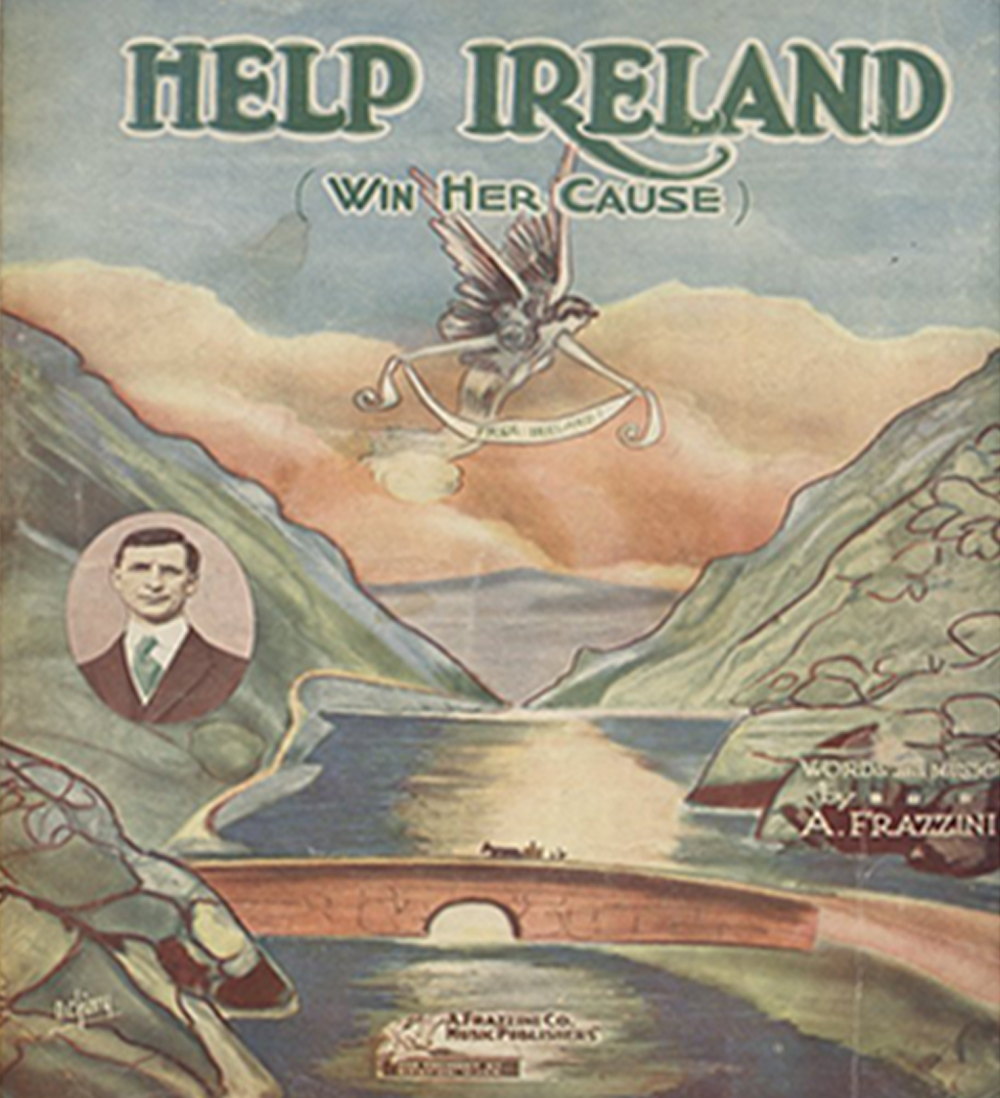1920
“Ireland, dear, never fear, soon you’ll have your way.”
This confident line begins the chorus to a long forgotten song, copyrighted in Boston in February 1920. Help Ireland (Win Her Cause) is an example of the extent to which American popular culture had appropriated Irish independence as a theme in the years following the Easter 1916 Rising. It also marks a significant year in diplomatic relations between Ireland and the United States.
Dáil Éireann emissaries Harry Boland and Patrick McCartan were overshadowed when Eamon de Valera commenced his now famous ‘mission to America’. From June 1919 until December 1920, De Valera elevated the importance of American recognition for the nascent Irish Republic by speaking to mass rallies all across the country, following routes carved out by predecessors such as Charles Stewart Parnell and Michael Davitt, hoping that the influence of some one million Irish-born, plus their American-born sons and daughters, could bring pressure to bear on Washington, D.C. He garnered reams of newspaper coverage, made at least three nationally broadcast radio addresses, and helped sell millions of dollar’s worth of bond-certificates to finance the work of the Dáil.
All of this indelibly associated De Valera’s name and face with Ireland, which is why there was no need to identify his portrait on the sheet music cover of Help Ireland. In distilled forms like this, Ireland’s cause was disseminated far beyond the limits of Irish America too.

But De Valera found it much, much harder to get his way in political circles in the United States. His visit coincided with a critical period in Ireland’s War for Independence as well as for American foreign policy in the aftermath of World War I. Gaining support for self-determination for Ireland from the White House in this tense atmosphere thus required more delicate maneuvering, since earlier efforts for recognition of Irish rights between 1916 and 1919 had been rebuffed.
De Valera positioned Ireland as a small, emerging nation for whom the League of Nations, an international peace organization established as part of the Treaty of Versailles, could be advantageous if it acknowledged Irish independence. But he had essentially parachuted into the midst of an awkward situation. Irish Americans were strongly opposed to their President, Woodrow Wilson, over American membership in the League and veteran Irish American politicians believed such an international alliance would render impotent any subsequent efforts by the United States to challenge Great Britain’s territorial sovereignty over Ireland. The reluctance of the State Department to confer legitimacy on Ireland because of Anglo-American post-war relations compounded matters.
On 27 October 1920, when American newspapers were reporting reactions to the death on hunger strike of Terence MacSwiney, De Valera sent an open letter to President Wilson:
“The people of Ireland are a good people and … it is not to be believed that the United States would abandon the principal of ‘government by the consent of the governed,’ which has always been a fundamental guiding principal of its national policy, reiterated with special emphasis during the war by you, Sir, as the necessary basis of any peace which the United States would feel justified in guaranteeing. The people of Ireland and their government are confident that their claim to recognition will not be refused or ignored by the Government of the United States.”
But, unfortunately, it was.
Circumstances notwithstanding, Ireland’s Request to the Government of the United States of America for Recognition as a Sovereign Independent State, published by the office of the Irish Diplomatic Mission, in Washington, D.C. in 1920, has the distinction of being one of Ireland’s earliest American foreign policy documents.
Marion R. Casey
About the Author
Marion R. Casey, a graduate of University College Dublin, is on the faculty of New York University’s Glucksman Ireland House. She is the co-editor with Joe Lee of Making the Irish American: History and Heritage of the Irish in the United States. In 2011, she curated a major exhibition at the New York Public Library for the Performing Arts for Culture Ireland and, with funding from the Department of Foreign Affairs and Trade, she co-curated two travelling exhibitions Labor and Dignity: James Connolly in America (2013) and The Fifth Province: County Societies in Irish America (2010).
Caption for illustration:Sheetmusic, Help Ireland (Win Her Cause), by Al Frazzini (Boston: A. Frazzini Pub. Co., 1920). Courtesy of the Irish Fest Collection, Ward Irish Music Archives, Milwaukee Irish Fest.


